Dialogue on Tibet: Past, Present and Future
◆ Compiled and edited by Li Lijuan Photograph by Duan Wei
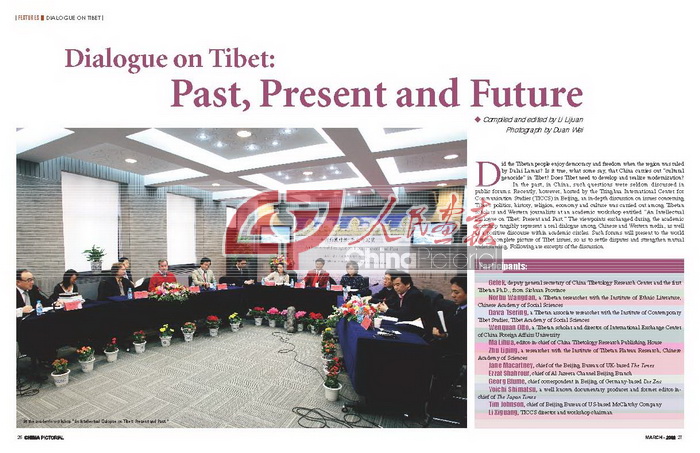
|
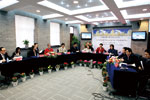 At the academic workshop "An Intellectual Dialogue on Tibet: Present and Past."
At the academic workshop "An Intellectual Dialogue on Tibet: Present and Past." |
|
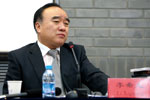 Li Xiguang
Li Xiguang
|
|
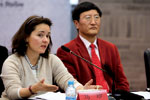 Jane Macartney
Jane Macartney
|
|
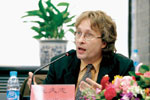 Georg Blume
Georg Blume
|
|
 Wenquan Otto
Wenquan Otto
|
|
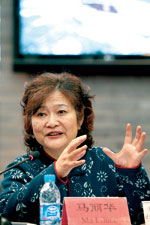 Ma Lihua
Ma Lihua
|
|

Ezzat Shahrour |
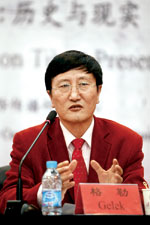
Gelek |
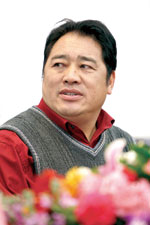
Dawa Tsering |
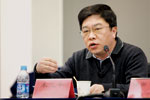
Zhu Liping |
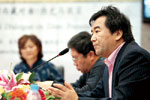
Norbu Wangdan |
|
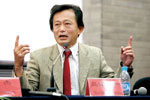 Yoichi Shimatsu
Yoichi Shimatsu
|
Did the Tibetan people enjoy democracy and freedom when the region was ruled by Dalai Lamas? Is it true, what some say, that China carries out "cultural genocide" in Tibet? Does Tibet need to develop and realize modernization?
In the past, in China, such questions were seldom discussed in public forums. Recently, however, hosted by the Tsinghua International Center for Communication Studies (TICCS) in Beijing, an in-depth discussion on issues concerning Tibet's politics, history, religion, economy and culture was carried out among Tibetan scholars and Western journalists at an academic workshop entitled "An Intellectual Dialogue on Tibet: Present and Past." The viewpoints exchanged during the academic workshop tangibly represent a real dialogue among Chinese and Western media, as well as a positive discourse within academic circles. Such forums will present to the world a more complete picture of Tibet issues, so as to settle disputes and strengthen mutual understanding. Following are excerpts of the discussion.
Participants:
Gelek, deputy general secretary of China Tibetology Research Center and the first Tibetan Ph.D., from Sichuan Province
Norbu Wangdan, a Tibetan researcher with the Institute of Ethnic Literature, Chinese Academy of Social Sciences
Dawa Tsering, a Tibetan associate researcher with the Institute of Contemporary Tibet Studies, Tibet Academy of Social Sciences
Wenquan Otto, a Tibetan scholar and director of International Exchange Center of China Foreign Affairs University
Ma Lihua, editor-in-chief of China Tibetology Research Publishing House
Zhu Liping, a researcher with the Institute of Tibetan Plateau Research, Chinese Academy of Sciences
Jane Macartney, chief of the Beijing Bureau of UK-based The Times
Ezzat Shahrour, chief of Al Jazeera Channel Beijing Branch
Georg Blume, chief correspondent in Beijing of Germany-based Die Zeit
Yoichi Shimatsu, a well known documentary producer and former editor-in-chief of The Japan Times
Tim Johnson, chief of Beijing Bureau of US-based McClatchy Company
Li Xiguang, TICCS director and workshop chairman
Li Xiguang: Today, Chinese and Western scholars and journalists gather here to conduct an open discussion on issues concerning Tibet and the Dalai Lama. Here is the first question. Do you acknowledge the view that "China took over Tibet," a premise widely accepted by the Western press? Did Tibetans enjoy democracy and freedom when the region was ruled by Dalai Lamas?
Jane Macartney: I don't want to discuss perspectives, but things we actually know. So, why the Western media uses expressions like "China took over Tibet" and what Tibet was like before 1959 or before 1951 have little to do with today's meeting. What we need to know is what today's Tibetans want, and how they view the Dalai Lama. In the course of personal contact with Tibetans, I have found that they have great respect for the Dalai Lama. The question we should ask is whether Tibet will continue to advance? If yes, in what direction will the region go?
Li Xiguang: Ms. Macartney just stated that the things that happened in Tibet before 1959 have nothing to do with today's topics. But, in recent years, the Dalai Lama has repeatedly accused the Chinese government of carrying out "cultural genocide in Tibet," a view based on a positive recognition of Tibetan history before 1959. I want to ask: Is it true that China carries out "cultural genocide" in Tibet? Has Tibetan culture been flawless and perfect from the very beginning?
Georg Blume: It seems we are trapped in the hypothesis that the Tibetan people still lead primitive, religiously devout lives. I met some Tibetans in 2008. They do have religious beliefs, but to a large extent, their lives are also impacted by Western culture and urbanization. They also like to wear jeans and listen to pop music. We can't limit ourselves to a religious angle when talking about Tibetan issues. In my opinion, we shouldn't over idealize and mystify Tibet. We should take into account the relationship between Tibet and other parts of China. Certainly, people should have more opportunities to visit Tibet, and to see what is actually happening there.
Wenquan Otto: Here are my opinions: First, I think we should discuss Tibetan culture, society and history against the backdrop of all of China. Everything happening in Tibet is closely associated to the historic destiny of the entire nation. The Cultural Revolution brought a severe cultural catastrophe to Tibet, and an even severer one in other parts of China. Second, Tibetan-inhabited areas are not secluded from the secular world. The living conditions are very tough, with high altitudes and sparse oxygen. Without any spiritual faith, locals couldn't develop a brilliant culture in such a terrible environment. Tibetan culture is the faith believed by local people. Third, Tibetan culture will achieve modernization with social advancement. I think the current political, economic and cultural systems provide unprecedented opportunity and a platform for the development of Tibetan culture. It is largely due to that platform that my elder brother can run Tibetan-style restaurants in Tibet, Beijing and Yunnan, and will expand to such cities as Shanghai and Guangzhou, and that my sisters can form a Tibetan band. This evidences the long-standing saying 'The more national, the more global.' We should not let this historic opportunity slip away. Fourth, is it true that Tibetan-inhabited areas have no problems? No. There are problems and difficulties, such as the unemployment rate among young people. But, it is unreasonable to try to solve those problems by resorting to means other than peaceful development.
Li Xiguang: Mr. Otto stated that Tibet needed to seek development and modernization. The coverage of Tibet by Western media, including Al Jazeera English Channel, indicates that Tibetans aren't satisfied with modernization and the changes occurring in the region after 1959. I'd like to invite scholars and reporters working in Tibetan-inhabited areas to share their opinions on this issue.
Ma Lihua: I met an elder when I visited the region in the 1980s. Before his death, his relatives asked whether he had an unrealized wish. According to the traditional culture of Tibetan herdsmen, one should hold no regrets upon their death, or they would not realize reincarnation. The dying elder answered he would have no regret if he saw a movie before his death. Perhaps such a request and emotion cannot be grasped by those who never lived in the region.
The West always advocates that traditional culture should be preserved. I also agree in the importance of maintaining the characteristic culture of Tibetan people. But, I'd like to devote more energy to advocating that Tibetan people have the right to enjoy all the benefits brought by modern culture and science, as well as by the advancement of human civilization, and they are entitled to choose their own way of life and improve their standard of living.
Yoichi Shimatsu: Now I work in the Tibetan-inhabited areas of the Sichuan and Gansu provinces, where Tibetan people enjoy a substantial right to speak in local government, since many officials are Tibetans. I'd like to talk about the future of Tibet and the next-generation of Tibetans. The next generation doesn't refer to those of the young age, but to an increasing number of modern Tibetans who, instead of being restricted to traditional agricultural and nominal lifestyles, tend to present themselves more on the international stage and communicate in multiple languages.
Ezzat Shahrour: It is an undeniable fact that the coverage of the Dalai Lama by some Western media organizations isn't just, objective and neutral. However, I don't think they should take 100 percent of the responsibility for this. Why?
First, Chinese spokespersons are skilled at keeping silent on sensitive issues. I wish to hear your voice, but you don't give me the chance to carry out neutral, objective and just coverage.
Second, when I accept interviews by Chinese media, most reporters stick to one question: What do you think of Western coverage of China? Chinese people attach too much importance to the issue of 'face.' Just let Western media report what they want. Who cares?
Third, some Western countries and media organizations have successfully projected the Dalai Lama as the sole legal representative of Tibetans around the world. However, the government of Tibet Autonomous Region hasn't put forth a person representing Tibetans to talk on an open basis about their worries and problems with the Chinese Central Government. Meanwhile, the Chinese authorities haven't a widely-accepted Tibetan representative, through whom they may mitigate problems. In this circumstance, the Dalai Lama becomes the sole legal representative of Tibetans, and Tibet thus becomes a global issue. What I worry about is certain religions around the world are tending to extremism. Now the Dalai Lama is old, and he has not long to live. However, the Tibetan Youth Congress is tending towards becoming an extremist organization. I'm not sure whether Tibet will become a chaotic place like today's Gaza Strip, if China finds no solution.
Li Xiguang: The next question concerns the so-called "Greater Tibet" proposed by the Dalai Lama, which is a favored subject of Western media reports. Should we practice the so-called "Greater Tibet," which is based on the concept of an exclusive ethnic group, religion and culture?
Jane Macartney: During my past reporting journeys, I asked some locals whether they desired the return of the Dalai Lama. Few responded with "No." Then I asked, "Do you wish that the Chinese government would leave Tibet?" The interviewees would look at me with puzzlement because they didn't think the two concepts contradicted each other. They desire the return of the Dalai Lama to regain religious identification, and in the meantime, they want to enjoy the economic prosperity brought by the Chinese Central Government. The question about which I would like to consult with experts, is how to achieve that goal.
Georg Blume: The Western media always takes Tibet as a country when covering Tibetan issues, and misconceives Tibet issues as conflicts between two civilizations or two countries. This is due to cultural differences. In Europe, people habitually see one nationality as one country, but Chinese people are accustomed to thinking in terms of a multi-ethnic nation.
China often criticizes the Western media, asserting that their reports are biased and never criticize the so-called "Greater Tibet" advocated by the Dalai Lama. In fact, it is not wrong for Western media to report disputes concerning Tibet issues. We shouldn't neglect problems in the course of development and pretend there aren't any problems once a regional economy advances.
Gelek: If you ask Tibetan people whether they expect the return of the Dalai Lama, most will answer yes, because in their mind the Dalai Lama represents holiness and is an incarnation of mercy. However, they need the Communist Party of China and the Central Government to liberate them from serfdom and help them feed themselves, construct roads and facilitate transport. First of all, we must realize Tibetans are ordinary people, who don't think in a way merely based on religious beliefs or knowledge of modern science. Basically, physicians are people with a certain level of scientific knowledge. I met a Tibetan physician. When his wife was to deliver a child or he was sick, he didn't trust himself, but consulted other doctors. Even so, he would ask for divinations from lamas in his village. This is the reality.
Negotiation is a prerequisite for the return of the Dalai Lama, and the "Greater Tibet" is a subject of negotiation. Historically, the so-called "Greater Tibet" never existed. Of course, it is impossible to recover something that never existed.
In addition, the so-called "high degree of autonomy" is another pending question. Since the Tibet Autonomous Region was established more than four decades ago, Tibetan officials have accounted for more than 70 percent of local government at different levels, ranging from chairman of the people's government of the autonomous region and chairman of the Standing Committee of the region's People's Congress to heads of townships. The so-called "high degree of autonomy" could be an unsolved problem only if the foresaid fact was denied. If so, however, it is against the interest and will of most Tibetan people.
Yoichi Shimatsu: The 14th Dalai Lama seeks to build the so-called "Greater Tibet" because the 13th Dalai Lama predicted that his reincarnation would take place in Qinghai Province. When the British colonial government in India dispatched troops to take over Lhasa, the 13th Dalai Lama fled from Tibet to reside in Qinghai from 1903 to 1905. Why did he choose Qinghai? Because according to an ancient prophesy recorded in the Tibetan Buddhist classic Kalachakra Tantra, invaders from India would eliminate Buddhism, so the Dalai Lama had to retreat to the remotest area in Qinghai and then allied with Buddhists from around Asia to launch an "ultimate war" against the invaders. During this period, the 13th Dalai Lama became acquainted with a special agent attached to the Ministry of Foreign Affairs of Japan. At that time, Japan was an ally of Great Britain. With the assistance of the Japanese government, the British colonial government in India ceased its military invasion of Tibet, and the 13th Dalai Lama returned to Lhasa. However, Tibet gradually became a "subordinate state" of the British colonial government in India.
We must realize that the 14th Dalai Lama seeks to build the so-called "Greater Tibet" because he merely wants to create a fairytale "castle" in Qinghai. Fairy tales are not history. We must gain a better grasp of history, so as to determine what actually occurred in the past.